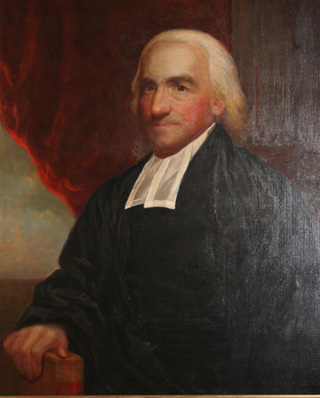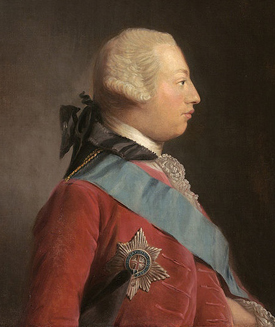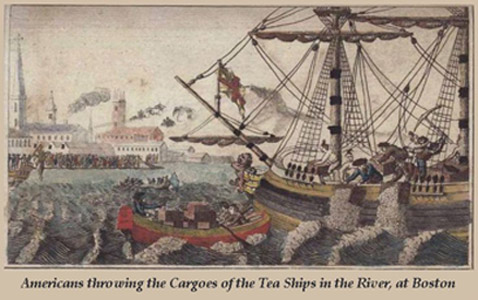John Lathrop
John Lathrop Bares his Sword
 John Lathrop was the seventh minister of Old North [Second] Church. The Church’s line of ministers had included a seminal shaper of congregational governance in the Colonial church, a president of Harvard, a leading opponent of Witchcraft, a proponent of vaccine for smallpox, and the champion of a second Charter for the Mass Bay Colony.
John Lathrop was the seventh minister of Old North [Second] Church. The Church’s line of ministers had included a seminal shaper of congregational governance in the Colonial church, a president of Harvard, a leading opponent of Witchcraft, a proponent of vaccine for smallpox, and the champion of a second Charter for the Mass Bay Colony.
Initially, the Mass Bay Company had sought freedom from oppression at home by leaving England for a New World. Now, over a century later, and as a rapidly growing and successful colony, the oppression came from overseas. A desire for total independence was seizing the nascent country.
What position would the ministers take on this call for revolution.? What is the Biblical authority for war? Charles Chauncy of ‘Old Brick’ was already known to ‘cry for Liberty.’ Where would John Lathrop, and his Second Church ‘Nest of Traitors,’ stand?
Leading up to War1
‘...a shocking reverse to what reason dictates, and the scriptures enjoin, have the actions of mankind exhibited in all ages of the world. Age, natural superiority, and a great variety of circumstances give some of the children of men opportunity to rule over others. And such is the love of power, that those who had a little were constantly wishing for more; and those who had arrived to great authority grew impatient of restraint, and wished for absolute dominion.
‘Masters, the rich, parents, governors have been guilty of violence. And should we cast an eye over the Kingdoms of the world at the present day, we shall discover the effects of oppression and violence on every quarter of the globe.
 ‘Unwearied attempts have been made by the powers of Great-Britain to deprive the inhabitants of this land of their most valuable interests. We saw those sacred Charters which confirmed to us the essential rights of freemen [become] the sport of a prince, who was bound by solemn ties to observe [those rights].
‘Unwearied attempts have been made by the powers of Great-Britain to deprive the inhabitants of this land of their most valuable interests. We saw those sacred Charters which confirmed to us the essential rights of freemen [become] the sport of a prince, who was bound by solemn ties to observe [those rights].
‘The shocking [Boston] massacre, which we shall never forget, may be consider’d as the commencement of hostilities by the British troops in America. And the inhabitants of these States [would] have been justified by the impartial world, had they resolved from that moment never to suffer one in the livery of George the III to walk this ground.
‘The enemy took peculiar pleasure in abusing the houses erected for the worship of God. One venerable pile, known by the name of the OLD-NORTH [Second Church] was torn to pieces by the sons of violence.
‘Every son of freedom thoughout this Continent must be justified in the view of that God who hateth violence and cruelty, when he draws his sword, and, appealing to Heaven, solemnly swears that he will never sheathe it, till those miscreants — those enemies to the common rights of mankind, are utterly destroyed, or drove from this once happy land.
‘Should we suffer ourselves to be conquered, we must bid adieu, a final adieu to freedom civil and religious: — To property: — To domestic happiness, and the most valuable blessings which now distinguish Americans from the wretched subjects of foreign despotic sovereigns.’
The Specific Cause2
‘The Parliament of Great-Britain, some years ago, passed an Act, declaring ‘That his Majesty in Parliament, OF RIGHT, had power to bind the people of these Colonies by statutes IN ALL CASES WHATSOEVER.’ — The import of these words needs no discant: For the wit of man cannot possibly form a more clear, concise, and comprehensive definition and sentence of slavery than these expressions contain.
‘If Great-Britain is jealous of the increasing interest [expansion] of the colonies, no doubt she will exert her power to check their growth, or her policy to draw off their riches as fast as they acquire them. — The business then is to embarass new setlements, — to lay such burdens on the colonies now planted as to prevent emigrations to them from the crowded parts of Europe, and establish such laws as shall render not only the money, but the persons of Americans the property of the British Parliament, or of the crown.
‘As for example: — Great-Britain claims a right to take away ninetenths of our estates. — Have we a right to the remaining tenth? No. — To say we have is a ‘traitorous position.’ So, far from having property, according to these late found novels, we are our selves a property.’
‘If the British Parliament may ‘of right,’ without our consent, ‘give and grant’ any particular pasts of our property, for any particular purposes, they may [take back] the whole. They may with equal pretentions to right sell our persons as slaves to what masters they please. For Liberty, Life or Property can, with no constituency of words or ideas be termed a right of the possessors, while others have a right of taking them away at ‘pleasure.’
‘It is a calamity that the parliament have resolved: — ’That colonists may be transported to England, and tried there upon accusations for treason, — or concealments of treasons committed in the colonies.’ Should any unhappy Americans be accused of treason, and prosecuted according to this act, a severe punishment would necessarily be inflicted on them before it could be determined whether they were guilty or not.’
Justification for War3
 ‘Jesus Christ, the author and finisher of our faith, is stiled ‘the prince of peace.’ Ministers of religion are bound by the laws of their divine master to beseech the children of men to be reconciled to God, and be at peace with one another.
‘Jesus Christ, the author and finisher of our faith, is stiled ‘the prince of peace.’ Ministers of religion are bound by the laws of their divine master to beseech the children of men to be reconciled to God, and be at peace with one another.
‘The text [also] supposes there may be cases in which it is impossible even for a christian to live peaceably in the present world. — There may be cases in which the prince of peace himself does not require the subjects of his government to be quiet, and tamely submit to insults and abuses. — There may be cases in which a christian ought to unsheath the sword and resist unto blood. Christianity teaches us to be contented with the allotments of divine providence,
and forbids our looking with an envious eye on the possessions of others. — The doctrines of christianity are opposed to those lusts such as pride, ambition, a desire of large possessions and dominion over others, which are the source of wars and fightings.
‘But although the gospel breathes the most kind and benevolent spirit, it is plane from many passages in the new-testament, that the sacred writers supposed it possible, and very probable, that christians may be in such circumstances as would justify their contending with their enemies: ‘He that hath no Sword, let him sell his garment and buy one.’ [Luke XXII. 36, quoting Jesus.] We can scarcely form a conception of any state more completely wretched, than that of those unhappy mortals who lie at the mercy of absolute Sovereigns, whose word is the law, at whose nod the subjects tremble, and who may,
when they please, take the life or property of any who belong to their dominions. The necessity of preparing for unavoidable war is
sufficiently evident.
‘But we cannot close the subject without lamenting those moral disorders which are the source of wars and fightings; and expressing our most ardent wishes for universal peace. — And while we are studying the art of war, and endeavoring to prepare for defence against a common enemy, let us show to all who observe us, that we are the loyal subjects of Christ; and that in obedience to his precepts, we will never draw our sword in an unrighteous cause, whatever promises of honour, preferment, or riches, may possibly be made us as a reward.
’Let us inlist ourselves under the banner of Jesus, and having fought ‘the good fight of faith, and finished our course,’ God grant we may be admitted into his glorious kingdom, where the laws of righteousness shall never be violated and the children of peace shall never be disturbed.’
_________
John Lathrop also said:
‘The rights of conscience are unalienable...every man must give account of himself to God...every man must act for himself. Let us render thanks for the religious as well as civil liberty which we enjoy.’
‘Unawed by popish or prelatical authority, unfettered by the creeds of fellow mortals, we read, we think, and we judge for ourselves. God hath given us this freedom.’
‘The christian religion — the religion of love — has a peculiar excellency in that it affords comforts such as the world cannot give.’
‘As we comfort the bereaved, we are comforted.’
[1809] ‘Christians of all denominations are [now] tolerated. We have free liberty to read the scriptures, to examine them, to think for ourselves and to worship according to the dictates of conscience and our best judgment, and there are none to interrupt or make us afraid.’
‘Let us have peace rather than offense, mercy rather than vindication.’
Sources and further reading:
Excerpts from ‘The Discourses and Sermons of John Lathrop, Pastor of the Second Church in Boston, 1771-1809’
1 A Discourse Preached on March the Fifth, 1778: ‘The Earth is filled with Violence’ — Genesis VI. 13.
2 A Discourse Preached December 15th, 1774, Being the Day Recommended By the Provincial Congress To be Observed: ‘I will sing of mercy and judgment: unto thee O Lord will I sing.’ Psalm CI. 1.
3 A Sermon Preached To the Ancient and Honorable ARTILLERY-COMPANY in BOSTON New-England, June 6th, 1774. Being the Anniversary of their
Election of Officers: ‘If it be possible, as much as lieth in you, live peaceably with all men.’ Romans XII. 18.
WIKIPEDIA